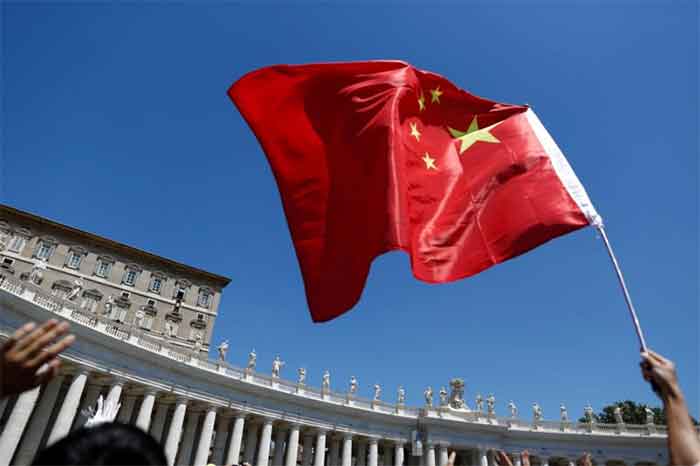
The Vatican Secretary of State Cardinal Pietro Parolin, has asserted the Vatican’s right to pursue an accord with Beijing on the appointment of bishops that has been strongly criticized by US Secretary of State Mike Pompeo.
Pompeo met Secretary of State Cardinal Pietro Parolin and Foreign Minister Archbishop Paul Gallagher on Thursday on a visit marked by Vatican irritation over Pompeo accusing the Holy See of putting its “moral authority” at risk if it renewed an agreement with China on the appointment of bishops.
In an article published in a conservative US Catholic publication, Pompeo has called Pope Francis’ pontificate a failure, sparked a minor diplomatic crisis. Vatican officials suggested Pompeo was trying to drag the Catholic Church into the US presidential election by denouncing its relations with China; an allegation Pompeo denied.
The Vatican wants to extend the China accord, which was signed in 2018 and envisages a process of dialogue in the selection of bishops. It hopes the agreement will help unite China’s Catholics, who have been split between those clandestinely following Rome – and those belonging to an official, state-sanctioned church set up by the Communist Party.
Parolin said the Vatican would renew the agreement when it expires this month, adding that Pompeo had expressed “understanding for the way the Holy See approaches these issues”.
Pompeo sought to downplay the differences in an interview with Fox News, but said he had urged the Holy See to take a stronger stance against Chinese restrictions on religious freedom.
“We had a constructive discussion,” Pompeo said after the meeting. “We have a shared objective. The Chinese Communist Party is behaving in ways that are reminiscent of what’s only happened in centuries past in terms of human rights violations. We’ve watched them oppress not only Muslim Uighurs but Christians, Catholics, Falun Gong, people of all faiths.
US President Donald Trump has taken an increasingly hard line on China ahead of the November 3 election. He is also associated with conservative Protestant and Catholic movements, many of which have been critical of Pope Francis.
Vatican signs historic deal with China
In September 2018, the Vatican and China signed a historic agreement on the appointment of Roman Catholic bishops. This was a breakthrough on an issue that for decades fuelled tensions between the Holy See and Beijing and thwarted efforts toward diplomatic relations.
The details of the deal have never been made public, but it gave the Vatican a say in the appointment of Catholic bishops in China. Pope Francis also recognized eight bishops that had been appointed by Beijing without his approval.
The agreement was described by the Vatican as “the fruit of a gradual and reciprocal rapprochement”, following a long process of careful negotiation, and subject to periodic review. “It concerns the nomination of bishops, a question of great importance for the life of the church, and creates the conditions for greater collaboration,” the Vatican said.
In Beijing, the foreign ministry put out a statement saying: “China and the Vatican will continue to maintain communications and push forward the process of improving relations between the two sides.”
The Vatican said that, as part of the deal, the pope would recognize seven Chinese bishops who were appointed by Beijing without the Vatican’s approval, and were excommunicated as illegitimate. Sources told Reuters the accord gave the Vatican a say in the naming of bishops and granted the pope veto power over candidates. China’s Catholics are split between an underground church swearing loyalty to the Vatican, and the state-supervised Catholic Patriotic Association (CPA).
The explosion of Christianity in China has mainly been seen in Protestant evangelical churches. Catholicism is a relatively minor religion, with an estimated 10-12 million adherents, according to the Guardian.
The Vatican has been keen to re-create ties with Beijing ever since the Communist authorities broke off diplomatic relations in 1951. Pope Francis has vigorously pursued rapprochement with the rising superpower. The Guardian said adding:
He has sent gifts to the Chinese President Jinping Xi, his homilies have been translated into Chinese, and in 2017 the Vatican dispatched 40 artworks to Beijing in a cultural exchange which, according to a senior Chinese official, signaled the “strong commitment for the development of civil relations” between the two.
A sign of Francis’s eagerness to curry favor with the Chinese has been his refusal to meet the Dalai Lama, knowing such an encounter would anger Beijing.
Abdus Sattar Ghazali is the Chief Editor of the Journal of America (www.journalofamerica.net) email: asghazali2011 (@) gmail.com
SIGN UP FOR COUNTERCURRENTS DAILY NEWSLETTER











































